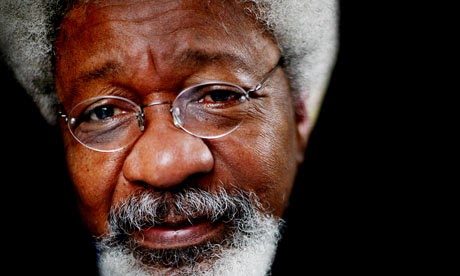By Exception
The session started with the Founder of the Uyo Book Club reading his poem, Ode to Wole Soyinka. Udeme Nana reviewed the life and times of the Nobel Laureate, his contributions to English Literature, human rights and good governance.
He described Wole Soyinka as a worthy role model and a titan of literature, and observed that the iconic man of letters was a pride to Nigeria and the black race.
Members of the club took turns to read some poems written by Wole Soyinka.
In his review of some of the plays of the celebrator, Professor Effiong Johnson of the Department of Theatre Arts and Film studies, University of Uyo, described The Swamp Dwellers as a dramatic prophecy which foretold rural-urban drift. But the main character, rather than gaining anything from moving to the city, lost all including his wife.
According to Professor Johnson, a critique of the book shows that Nigerians were still in the clutches of superstition which holds them down.
He observed that The Jero Plays is a satire on the Nigerian religious situation where adherents are gullible and are taken advantage of by their religious leaders. He described the play as a ‘slapstick on what people could suffer if they donate themselves to false prophets and prayer Houses.’
On The Republican, Professor Johnson said it was a commentary on the Nigerian condition when Nigeria became a republic, arguing that Soyinka must be feeling pained because all the conditions which he condemned when Nigeria became a republic in 1963 are still prevalent pointing out issues such as corruption, ethnic rivalry and lack of trust, among others.
Taking a look at Before the Black out, Professor Johnson said it was a bold affront against some well-known politicians in Nigeria at the time of writing the play.
He also observed that The lion and the Jewel is a play that shows the conflict between tradition and modernity: the main character, Lakunle representing modernity while Baroka, a stiff traditionalist who opposes development. Johnson observed that Soyinka made tradition to win in the work, pointing out that Wole Soyinka seems to say that Africans should be wary of modernity in that play.
The Professor of Theatre Arts and Film Studies said Kongi’s Harvest is a depiction of the military incursion in into government, observing that it was the wealth of the land which attracted Kongi to superimpose himself on the community.
‘‘Kongi formed his own leadership group but unlike the one he overthrew, the reformed Aweri leadership council which he put in place was not knowledgeable at all,’ adding that “Kongi was dictatorial and stripped the Oba of everything. Kongi even tries to take the spiritual power in addition to the traditional power,’’ he noted.
According to him, in Kongi’s Harvest, the playwright seems to call for resistance against bad government in the play.
In The Strong Breed, Soyinka is advocating a strong person to emerge who must carry the burden of the community and die for it on behalf of the people. The main character was running away from his community to escape his community only to meet the same fate in a strange community.
However, such annual rituals do not add value to the development of the community. In the words of Johnson ‘‘The application is that in contemporary society, the common man is the fodder who dies regularly so that politicians must live large.’’
According to Professor Johnson, Death and the King’s Horseman is arguably the most popular work of Soyinka in the world.
The Special Guest of Honour at the session, Professor Nyaudo Ndaeyo, Vice Chancellor of the University of Uyo congratulated the Book Club for honouring the erudite scholar on his attainment of 90 years.
‘‘I used to think we have lost it and reached a point of no return, but I now see hope with this gathering,’’ adding that
‘‘Wole Soyinka is an international figure worthy of all the honours bestowed on him.’’
He tasked the youths to prepare to step into the big shoes of Wole Soyinka, stating that the great poet was old now and cannot do much. According to him, ‘‘though things have fallen apart, someday, Nigerians shall be free.’’
In his remarks, the Patron of Uyo Book Club, Senator Ekong Sampson said that his visit to Uyo would have been incomplete if he did not show up at the club. He said that the place of Wole Soyinka in Nigeria as a philosopher-king is assured having made so many contributions to earn eternal respect of Nigerians.
The Senator representing Akwa Ibom South Senatorial District urged critics who blame him as obscure to study his works patiently. ‘‘I join millions of humanity to salute WS on 90,’’ he enjoined.
The highpoint was a toast proposed for Professor Soyinka by Professor Eno Urua of the University of Uyo. Members of the club drank to the good of the playwright, poet, essayist and human rights activist.
Exception is a member of Uyo Book Club

